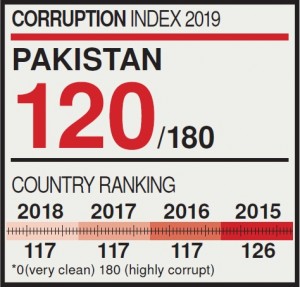Penchant for Corruption
How to root out the evil
Qasim Dhillon
Transparency International’s annual Corruption Perception Index ranks how crooked a country is on the basis of perceived levels of public-sector corruption. While we have reduced corruption to the files of government offices and people in charge of those, it is evident in every sphere of life. We are corrupt in toto. A roadside hawker sells a couple of rotten fruits in every dozen; a doctor prescribes medicines of a particular manufacturer and suggests a certain laboratory for testing; a banker misleadingly sells insurance products; hordes of impoverished people sell their legitimate right to vote during election, and so on. From destitute genre to affluent elites, corruption has turned into a way of life.
Literature is replete with hackneyed causes of corruption such as low salary in public sector, political intervention, lack of education, and poverty, to mention a few. However, there is more to it, which needs to be unravelled.
The biggest stimulus behind financial corruption is depravity. While we have built robust operating systems which flag even a marginal deviation from the SOPs, we have failed to ingrain morality and ethics in persons operating them. Moreover, most of these causes are pinpointed by academic researchers whose primary research substantially relies on questionnaires. Even the ways through which research data is collected are not corruption-free. Barring a few, the academic researchers get their research work done from the students they supervise for thesis, a requirement for completion of a student’s degree.
Absolutely indifferent to the research findings, these students either fill research questionnaires on their own or request their acquaintances who do this favour without paying heed to the questions and their responses. The results, therefore, are not much reliable. Moreover, academic researchers do not have work experience in public or private sector; thus, they are oblivious to the ground realities and their interpretations lack an in-depth analysis. The shoddy quality of research is also reflected in terms of dismal ranking of our varsities in the QS World University Rankings 2019 whereby only seven universities from Pakistan could qualify among the world’s top 1000.
The notion that low salary is the principal reason behind corruption lacks concrete evidence. Corruption, where it exists, is evenly conspicuous among all ranks. It runs through a chain of people. From where the chain starts in a particular case depends on the social status and prominence of the person willing to bribe. Tersely, corruption does not recognize salary slabs. Our history is littered with instances where higher-ups—even those with hefty salaries—in an organization were prosecuted and later on incarcerated for corruption. It is not the low level of salary but the feeling of being relatively underpaid. Corruption takes place when a qualified candidate is paid less than his under-qualified counterpart(s). The aggrieved then sees corruption money as an adequate compensation to bridge the gap between his actual and perceived reasonable salary.
The issue of political intervention is not Greek to us but what actually adds fuel to the fire is love for sinecure. Such a position opens wider avenues of corruption and offers more influence over large resources. Not all of the government officials tolerate unwarranted political pressure. Those who bent in the face of such influence are internally more inclined either towards securing a lucrative and influential position or they fear getting transferred far away from their native town. In addition to that, the desire to whether or not become a part of the entrenched mafia at workplace also influences an individual’s tendency for corrupt practices.
Lack of education, often cited as another major cause of corruption, does not engender corruption. We often see highly-qualified people undergoing corruption inquiries more often than those with low level of education. Moreover, educated people are more aware of the loopholes in prevailing internal controls in an organization and, thus, are more inclined towards making illegitimate gains. However, it is basically the lackluster education system that only emphasizes the transmission of knowledge rather than transformation of minds. Despite having utter disdain for corruption at the core of our curriculum, proclivity for corruption among educated individuals is ever rising. In his magnum opus “Fallen Leaves”, world-famous American writer, historian and philosopher, Will Durant, underpinned the vital role of teachers in the formation of character. He suggested that at the time of selection, apart from technical competence, the influence that a teacher’s personality, moral values and manners might have upon the children ought to be given equal weight. This highlights the prevailing gap in terms of abysmal role of teachers who failed to inculcate morality and ethics in their students. Resultantly, corruption in Pakistan has become an acceptable norm even among highly-qualified individuals.
Labelling poverty as an instigator for engaging in corrupt practices makes us overlook the actual stimulator. Had only poverty always instigated the desire of corruption, affluent people would have never pursued this reprehensible act. Even the CPI 2019 report asserts that corruption is more pervasive in countries where governments listen only to the voices of wealthy or well-connected individuals. It is not the state of being poor but the desire to accumulate more. Neither all poor are corrupt nor are all elites naïve. There are poor people who hardly make their both ends meet, but they do not get involved in corruption seeing it a vice. On the other hand, there are opulent people who inexorably commit corruption for the sake of stockpiling. Thus, linking poverty with corruption is not plausible.
Gone are the days when one would indulge into corrupt practices under compulsion of domestic hardships. The developments that took place in the public-sector working environment require policymakers to revisit the controls they had devised for stamping out corruption. Government officials rarely receive training to strengthen their professional expertise, let alone moral values. The best way to thwart the incessant penchant for corruption among officials is to train them and hone their characters. The prevailing best practices and internal controls in the cleanest public sector of New Zealand can be a useful tool.
Apart from the public sector, countering this tendency among large masses of Pakistan as a whole is a pressing concern. To start with, lessons entailing fruits of a corruption-free public sector may be included in the curriculum. Economic progress of Scandinavian countries is a good case in point. Even more effective could be the presence of teachers with impeccable character which can ensure generations to come to have a sound character.
Lastly, the government must earmark funds for research to be conducted by the working professionals. Sans a doubt, a qualified working individual, who has a research degree and first-hand experience of the working environment of an organization, can conduct a research far more efficiently than an academic researcher. Responses received through questionnaires and interviews, and findings through observation by a qualified working individual would be way more reliable and can be proved fruitful for policy-makers for improvising their strategies against corruption.
 Jahangir's World Times First Comprehensive Magazine for students/teachers of competitive exams and general readers as well.
Jahangir's World Times First Comprehensive Magazine for students/teachers of competitive exams and general readers as well.



